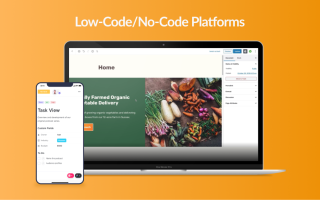You perhaps feel overwhelmed by the vast array of eCommerce platforms available online, right?
For the past few years, the eCommerce industry has been thriving. It’s even expected that the global e-commerce market will hit $6.3 trillion by 2025, which makes it both challenging and considerable to look for the right e-commerce platform for your online store.
From small businesses to multinational corporations, eCommerce platforms have transformed the way people buy and sell products and services worldwide. It offers businesses;
- Global reach
- Lower overhead costs
- 24/7 availability
- Access to customer data
- Personalized shopping experience
- Secure transactions
- Enhanced brand visibility
That’s why we’ve taken care of the hard work for you and put together a list of the 10 top e-commerce platforms to assist you in building a remarkable and rewarding online store. So, let’s get started without delay!
Table of Contents
Listing The Top eCommerce Platforms In The World, You Can Ever Search For
In this section, we’ll explore some of the finest eCommerce sites and delve into what makes them so well-known.
1. Amazon Business

The list of top eCommerce platforms begins with Amazon Business. Launched in 2015, Amazon Business has grown rapidly, becoming one of the top e-commerce platforms globally now. It has millions of products ranging from office supplies to industrial equipment, which allow businesses to find anything they require.
The advanced business tools used at Amazon Business guarantee a smooth purchasing journey. Thus, Amazon Business can be your trustworthy partner in this digital industry.
key feature
- Bulk purchasing options for cost savings.
- Tax-exempt purchasing for eligible organizations.
- Streamlined purchasing approval workflows.
- Business pricing and quantity discounts.
- Integration with procurement systems.
- Enhanced analytics and reporting capabilities.
Here’s to look the pros and cons of the platform:
| Pros | Cons |
| Wide range of products | Higher fees for sellers |
| Convenient purchasing process | Intense competition |
| Business-specific features | Limited storefront customization |
Read Also: Top 10 Professional Ghostwriting Services in the USA
2. AliExpress
AliExpress is a global eCommerce giant. It provides a place for online shopping with its vast product selection and competitive pricing. At Alibaba, there are millions of buyers and sellers from all across the globe are linked. They offer a diverse array of products, including electronics, fashion, and home goods.
All can use this platform and begin a smooth selling and shopping journey. Due to its global reach and affordability, AliExpress remains a go-to destination for buyers and sellers.
key feature
- Competitive pricing and frequent discounts.
- International shipping to many countries.
- Buyer protection program.
- User-friendly interface for browsing and purchasing.
- Customer reviews and ratings for products.
- Secure payment options, including credit card and PayPal.
Here’s to look the pros and cons of the platform:
| Pros | Cons |
| Vast product selection | Long shipping times |
| Buyer protection program | Varying product quality |
| Direct shipping options are available | Communication barriers with sellers |
3. eWorldTrade
eWorldTrade is another premier eCommerce destination. It’s a universally known platform with a primary focus on business-to-business transactions. eWorldTrade allows businesses to build connections, collaborate, and succeed in the digital market.
The platform has all types of products, spanning from electronics to textiles, which cater to diverse industry requirements. And every transaction on the platform, whether it’s done locally or internationally, is highly secure, giving buyers and sellers peace of mind. So, if your business wants to grow and form global partnerships in the digital age, eWorldTrade is the platform to choose.
key feature
- Connects buyers and suppliers worldwide.
- Wide range of product categories.
- Facilitates trade negotiations and transactions.
- Offers trade assurance and secure payment options.
- Provides tools for product sourcing and market research.
Here’s to look the pros and cons of the platform:
| Pros | Cons |
| Global reach with a focus on B2B | Limited consumer base |
| Extensive product categories | Significant investment for bulk orders |
| Trade assurance and secure payments | Quality control and supplier verification may vary |
Read Also: 10 Best Tactics to Optimize Your Google Shopping Campaigns
4. BigCommerce
When it comes to e-commerce platforms, BigCommerce stands another best. BigCommerce offers powerful features and customizable options, making it a comprehensive solution to meet the diverse needs of businesses of all sizes.
The platform has all the tools needed to create, manage, and grow an online store with ease. Whether you’re a small startup or a large enterprise, BigCommerce is available anytime to establish or expand your online presence.
key feature
- Customizable storefront designs.
- Built-in marketing and SEO tools.
- Multi-channel selling capabilities.
- Secure payment gateways.
- Mobile-friendly design.
- Robust analytics and reporting.
Here’s to look the pros and cons of the platform:
| Pros | Cons |
| Scalable platform for all sizes | Transaction fees based on sales volume |
| Built-in marketing tools | Requires technical knowledge |
| Customizable storefronts | Limited multichannel selling options |
5. eBay
EBay is a global powerhouse to connects buyers and sellers. It facilitates cross-border trade, allowing sellers to reach new markets and expand their customer base like never before.
No matter if you are a professional seller or just starting, eBay has an opportunity to unleash your selling potential and reach millions of buyers.
key feature
- Wide range of products available for sale.
- Auction-style listings for bidding.
- Buy It Now option for immediate purchase.
- Seller rating system for trustworthiness.
- Global shipping options.
- Buyer protection program.
- Mobile app for convenient shopping.
Here’s to look the pros and cons of the platform:
| Pros | Cons |
| Large customer base | High fees |
| Auction-style listings | Increasing competition |
| Seller protection program | Limited branding control |
6. Alibaba
The list can not be completed without mentioning Alibaba. It is a well-known global eCommerce platform involving buyers and sellers worldwide. The diverse product offerings of Alibaba make it a vast marketplace for businesses to choose.
Also, every transaction made on Alibaba is smooth. Thus, from sourcing to selling, Alibaba is the finest platform for businesses to thrive in the digital marketplace.
key feature
- Offers a wide range of products and services online.
- Provides B2B, B2C, and C2C services.
- Known for its extensive reach and market dominance in Asia.
- Facilitates international trade through its platforms.
- Continuously expanding its ecosystem through acquisitions and partnerships.
- A key player in shaping the digital economy in China and globally.
Here’s to look the pros and cons of the platform:
| Pros | Cons |
| Extensive supplier network | Language barriers with suppliers |
| Negotiable pricing for bulk orders | Quality control issues |
| Trade assurance and secure payments | Limited buyer protection |
Read Also: How is Artificial Intelligence Used in Healthcare?
7. Made-in-China
Made In China is the next on the list of e-commerce platforms. Mainly located in China, the platform is making it easier to source products from China. It offers direct communication to buyers with the China manufacturers and sellers.
This user-friendly interface and efficient shipping options make Made In China a go-to destination for businesses of all types.
key feature
- Mass production capabilities.
- Wide range of products.
- Global supply chain network.
- Innovation in technology.
- Diverse manufacturing expertise.
- Strong emphasis on quality control.
Here’s to look the pros and cons of the platform:
| Pros | Cons |
| Direct access to manufacturers | Quality control issues |
| Competitive pricing for bulk orders | Language barriers with suppliers |
| Trade assurance and secure payments | Limited product range |
8. Shopify
Shopify is an eCommerce platform that allows businesses to create, customize, and manage their online stores with ease. It offers a comprehensive solution for selling products and services online that businesses can use.
From small startups to large enterprises, Shopify gives the support needed to build a successful online presence.
key feature
- Customizable themes and templates for unique branding.
- Seamless integration with various payment gateways.
- Inventory management tools for tracking stock levels.
- Mobile commerce capabilities for on-the-go purchases.
- User-friendly interface for easy website management.
Here’s to look the pros and cons of the platform:
| Pros | Cons |
| User-friendly with customizable stores | Transaction fees for external payment gateways |
| Extensive app store | Limited control for customization |
| Scalable for all sizes | Additional costs for advanced features |
9. Walmart
Walmart is a global retail giant in the eCommerce industry. It offers a vast selection of products across various categories. With its extensive network of physical stores and an online presence, Walmart provides customers with convenient shopping options both in-store and online.
With fast shipping options and a user-friendly website, Walmart continues to be a go-to destination for shoppers worldwide while positioning it among the top global eCommerce platforms.
key feature
- Convenient one-stop shopping experience.
- Nationwide presence with thousands of stores.
- Online shopping with home delivery and in-store pickup options.
- Various payment methods including cash, card, and digital wallets.
- Customer-friendly return policy.
- Pharmacy services are available in many locations.
- Everyday low prices and frequent discounts.
Here’s to look the pros and cons of the platform:
| Pros | Cons |
| Trusted brand with a large customer base | Strict requirements for sellers |
| Competitive pricing and deals | Limited storefront customization |
| Integration with brick-and-mortar stores | Less flexibility in pricing and fees |
Read Also: How AI Tools Are Causing Spam Content Across the Internet
10. EC21
In the end, EC21 is a widely known eCommerce platform for its global marketplace. It links verified buyers and sellers across various industries. With a focus on international trade, EC21 facilitates transactions between businesses worldwide.
With features such as product listings, inquiries, and trade assurance, EC21 become a platform for businesses to engage in cross-border trade, making it a top choice for global commerce.
key feature
- Wide range of product categories.
- Secure trading environment.
- Variety of payment options.
- Language and currency support.
- Accessible customer support.
- Connects buyers and sellers worldwide.
Here’s to look the pros and cons of the platform:
| Pros | Cons |
| Focus on B2B transactions | Limited consumer base |
| Trade assurance and secure payments | Quality control and communication issues |
| Direct sourcing from manufacturers | Membership fee for certain features and services |
Read Also: Google’s 8 Best Practices For Ecommerce SEO Sites
Conclusion
And there you have it, our top picks for the best e-commerce platforms to launch your online store!
Keep in mind that choosing the right platform can significantly impact the success of your online venture. So, invest some time in exploring these fantastic options to find the one that best suits your business needs and goals.



